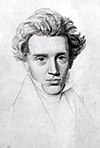Existentialism is a philosophical movement which posits that individuals create the meaning and essence of their lives, as opposed to it being created for them by deities or authorities or defined for them by philosophical or theological doctrines.
It emerged as a movement in twentieth-century literature and philosophy,
most notably Søren Kierkegaard and Friedrich Nietzsche, though it had forerunners in earlier centuries.
Fyodor Dostoevsky and Franz Kafka also described existential themes in their literary works. It took explicit form as a philosophical current inContinental philosophy, first in the work of Martin Heidegger and Karl Jaspers in the 1930s in Germany, and then in the work of Jean-Paul Sartre,
Albert Camus, and Simone de Beauvoir in the 1940s and 1950s in France. Their work focused on such themes as "dread , boredom, alienation, the absurd, freedom, commitment, and nothingness" as fundamental to human existence.[1]
Walter Kaufmann described existentialism as "The refusal to belong to any school
of thought, the repudiation of the adequacy of any body of beliefs whatever, and
especially of systems, and a marked dissatisfaction with traditional philosophy
as superficial, academic, and remote from life".[2]

